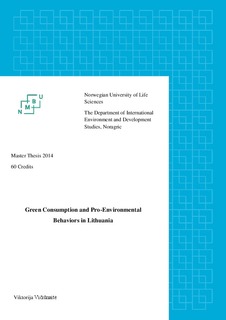| dc.contributor.author | Viciunaite, Viktorija | |
| dc.date.accessioned | 2015-07-27T11:06:43Z | |
| dc.date.available | 2015-07-27T11:06:43Z | |
| dc.date.copyright | 2014 | |
| dc.date.issued | 2015-07-27 | |
| dc.identifier.uri | http://hdl.handle.net/11250/293643 | |
| dc.description.abstract | The thesis is dedicated to finding out how to encourage an increase in green consumption and pro-environmental behaviors. The analysis was based on both qualitative and quantitative data, collected in Kaunas, Lithuania. The quantitative analysis was based on data collected from 112 surveys; the information gathered from the surveys was used for a logistic regression in order to find predictors of green consumption and for Pearson’s chi-square tests to see if the differences between green and conventional consumers were random or could be attributed to group membership. The qualitative analysis was based on 39 semi-structured interviews, which were analyzed using first and second cycle coding. The main theories used to interpret the findings were: general theories on what motivates human behavior (internalist, externalist and mixed), with extra emphasis on theories that explain what motivates seemingly non-selfish behaviors (Attitude-Behavior-Context model). Furthermore, theories on how to achieve and explain behavioral change were used (‘Positive spillover’ effect, Cognitive Dissonance Theory, Social Learning Theory). The findings of the research indicate that green consumption is best predicted by gender (women), egoistic (health) and biospheric (environmental) concerns. Even though mixed (egoistic and biospheric) concerns were the best predictors in the regression, other findings indicate that it is egoistic concerns that dominate the decision making processes of green consumers. Based on the findings, the best ways of encouraging behavioral change are either by creating a convenient external context – especially infrastructural and financial – or by creating desirable values and attitudes in people, by educating them formally, through social advertising and through social learning. | nb_NO |
| dc.language.iso | eng | nb_NO |
| dc.publisher | Norwegian University of Life Sciences, Ås | |
| dc.rights | Navngivelse-Ikkekommersiell-IngenBearbeidelse 3.0 Norge | * |
| dc.rights.uri | http://creativecommons.org/licenses/by-nc-nd/3.0/no/ | * |
| dc.subject | Green consumption | nb_NO |
| dc.subject | Pro-environmental behaviors | nb_NO |
| dc.subject | Environmental (biospheric) concerns | nb_NO |
| dc.subject | Health (egoistic) concern | nb_NO |
| dc.subject | Logistic regression | nb_NO |
| dc.subject | Pearson’s chi-square | nb_NO |
| dc.subject | First and second cycle coding | nb_NO |
| dc.subject | Mixed methods research | nb_NO |
| dc.title | Green consumption and pro-environmental behaviors in Lithuania | nb_NO |
| dc.type | Master thesis | nb_NO |
| dc.subject.nsi | VDP::Social science: 200 | nb_NO |
| dc.source.pagenumber | 144 | nb_NO |
| dc.description.localcode | M-IES | nb_NO |

